Mortlake producers supply carbon-neutral brand
One of the Western District’s oldest farming families is taking bold leaps into some of the newest and constantly evolving markets of branded carbon-neutral beef and soil carbon.
One of the Western District’s oldest farming families is taking bold leaps into some of the newest and constantly evolving markets of branded carbon-neutral beef and soil carbon.
The Allen family name is synonymous with cattle production in the Mortlake region.
Nick and Sophie Allen, along with their two children, farm 2250ha with Nick’s parents David and Sandy over four properties centred around the historic Boorook property, where Allens have farmed since 1906.
Nick has been home since 2007. He went from school to working on an organic cattle station at Birdsville, and then onto Marcus Oldham. In his practical year, during his studies, Nick worked at Lawson Angus at Yea, and then Werribee Ag.
The farm he returned to was running 7000 Merinos and 400 breeding cows and finishing two and-a half year old bullocks for Teys in Naracoorte, South Australia.
“It wasn’t that efficient, trying to finish bullocks, depending on the season,” he said.
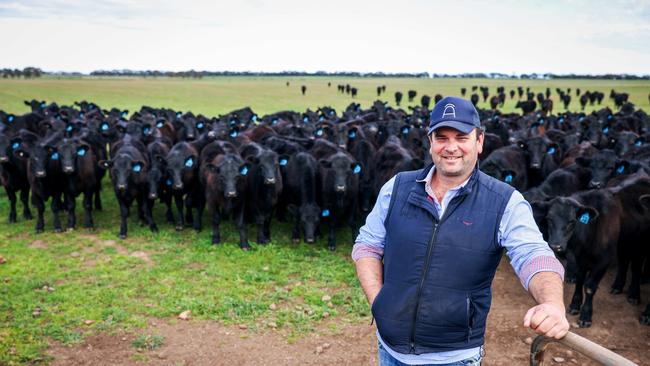
Next, the family moved to supply JBS’s Great Southern grass-fed brand, supplying a closer market in Melbourne.
“JBS still wanted a pretty big carcass, so in 2019 we moved over to Coles, supplying a domestic market weight carcass,” Nick said.
“The longer you feed, the more environmental risk there is, especially with grass finishing, you do open yourself up to complications.
“Supermarket weights suit what we do, a spring calving operation and the lower (turn off) carcass weight, 280-300kg dressed.
“To get the dollars per-head for JBS, we needed to go 320-340kg, which doesn’t sound like a big jump but can be, depending on the time of year.”
CATTLE BRED FOR MARKET ACCEPTANCE
Their breeding direction has been one that has adapted to suit the markets.
It was originally a Hereford herd, but the Allens introduced Angus in a crossbreeding program that included Murray Greys, Hereford, Black Simmental and more recently Stabilizer bulls from Paringa.
In the past 15 years Nick has bred out the coloured cattle to ensure they could produce a consistent type to meet specifications Coles required.
However, Nick said he would return to crossbreeding – to tap into the hybrid vigour benefit – “once I have all the genetics right”.
The Allens run 1000 breeding cows plus another 1000 young and trade cattle along with 1500 sheep. This produces an average of 16 DSE/ha, or a total DSE to the end of July of 28,419 on 1780ha grazing area.
The rest of the farm is locked up for fodder conservation or native grasses and trees.
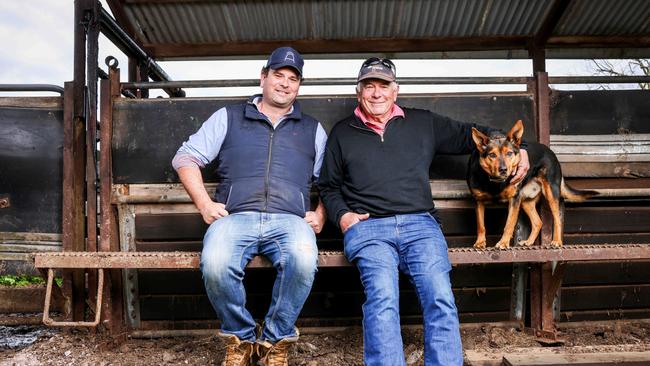
The workload is carried by Nick, David and one farm employee. “It’s quite efficient; but cattle are labour friendly,” Nick said.
Supplying Coles, Nick said he was targeting 1kg/day weight gain, “that means we can get our first load of cattle out at 550kg live weight at 15-16 months in December, off grass, then we
supplementary feed”.
“We try to have a really high input system but it means we finish them before their second winter and don’t have to carry surplus cattle though.
“All our steers and heifers we don’t keep for breeding are gone by May, which helps make room for the next age group then we start calving in August.”
ROTATIONAL GRAZING FOR EFFICIENCY
Supplementary feeding is done after weaning at five months. Calves are fed silage and vetch or clover hay, and grass.
“Then we go to rotational grazing when the silage runs out at the end of autumn,” he said.
Cell grazing has been set up on one of the Mortlake properties and at Purnim.
“Being an ex-dairy we had the small paddocks already established which makes the rotation pretty intensive currently two mobs of 150 yearling steers rotating around 62 paddocks,” he said.
On breeding country pastures are rye-grass and clovers but re-sowing is phalaris and clovers.
“Crickets don’t eat phalaris, it lasts longer than rye-grass and grows more bulk – important for a cow-calf operation,” he said.
“I’m also sowing it in dairy country at Purnim which the dairy guys are scratching their heads about”.
At the Purnim property cattle are rotated every 30 days or so, with 150 300kg steers on an average of 1.5ha each.
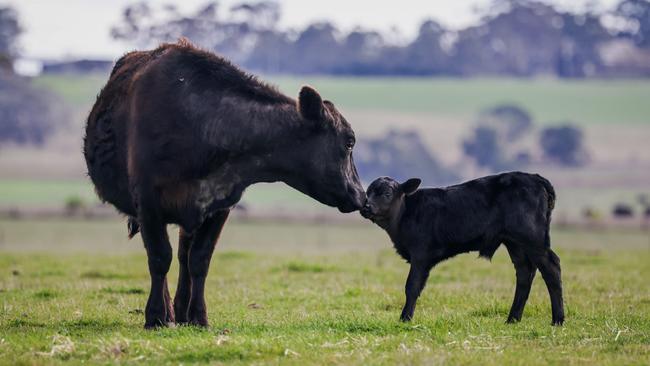
As well as conventional products, liquid and solid composts are applied to paddocks.
Most fodder is homegrown, with some contractors used.
The top five per cent of calves are normally finished on grass. Summer crops are used occasionally, if the season allows.
Following that the cattle eat grain-free legume pellets, which comply with Coles’ brand requirements, from circular in-paddock feeders.
FEEDBACK HELPS DECISION MAKING
“We finish most cattle in autumn when Coles have a lower supply of grass-fed cattle; we supply the carbon neutral and the Graze brand, so we try to supply cattle that are out of season, hopefully we can aim for a better price and we can always get the cattle in.
“It is a good fit for our system and now over 90 per cent of our cattle have 0 teeth because of their age at processing, this helps the MSA index with a very low ossification score.
“At the start we had more variability but we are getting better and higher MSA figures.
“Now we target genetics to suit the supermarket-target band, and looking at the feedback kill sheets we try to get MSA indexes over 60.”
In the past 12 months the Allens turned off 800 finished cattle, with a few traded to fill gaps in our own bread cattle. They sell directly with Coles, taking spot prices.
“I give (Coles) as much notice as I can, when the cattle are going onto the feeders,” Nick said. “It has been a good relationship and I hope it lasts a long time.”
The Allens have been in the Coles Carbon Neutral brand from the start. The first step was to work out their carbon footprint numbers – the tonnes of carbon per kilo of beef produced.
Their emissions intensity number is now around 11.2 CO2e/kg/live weight which Nick said was very similar to others supplying the CN brand.
Coles then purchase offset for those emissions/kg beef sold for that brand.
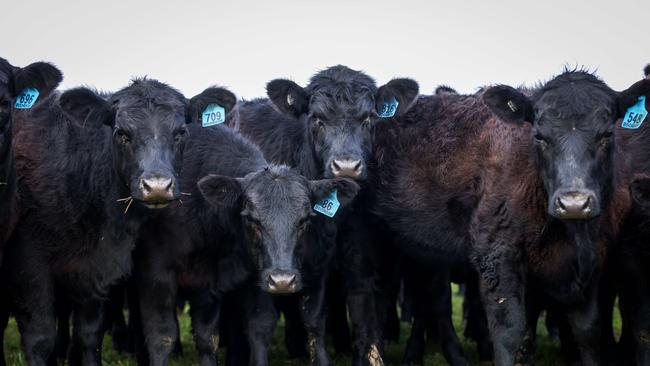
For producers, Nick said it was all about learning where the EI number was in the enterprise and where more efficiencies could be found. Seasonal variability played a role, however.
For example, in a year where more hay was needed, EI could rise.
“Things like season are out of your control, but we can do other things, like not keeping dry cows, and ensuring fast weight gain – which is better for the supply chain and for the producer it is more profitable,” he said.
High MSA indexing carcasses were also very important, so he selected early maturing and carcass genetics with bulls from Dunoon and Paringa.
“I’m also looking at EMA and IMF, which I haven’t focused on in the past, but with the feedback I’m looking at it,” he said.
“Not that there is payment for that now, but I think in future it will drive MSA more, growing the highest quality animal in the shortest time is our focus.”
“We spend a lot of money on genetics but because we breed and finish we’re getting the benefits of them for their whole life, which helps justify our AI program on all heifers and the spending on bulls.”
MEASURING FOR BEST RESULTS
AI for heifers also avoided having to also source heifer-suited bulls, allowing the Allens to purchase bulls with growth suited to cows.
The surety of access to market – being able to book them in when they were ready – was very
valuable to a high input system, he said.
Supplying the branded lines did include more auditing, but Nick said it was “not too onerous”.
Nick said Coles’ move to have a branded CN product was “very progressive”.
And for the broader industry, Nick said it was “not an issue that is going away.”
“It gives there customers a choice at the shelf, I buy steaks from both Carbon Neutral and Graze brands”.
Eventually the Allens may feed their cattle supplements to reduce methane output, potentially
through water systems or vaccines. “I think there will be answers coming down the track,” David said.
While the Allens were not focused on CN of the entire farm system at the moment, they had
invested significantly in a soil carbon project, doing baseline testing four years ago for a 25 year project.
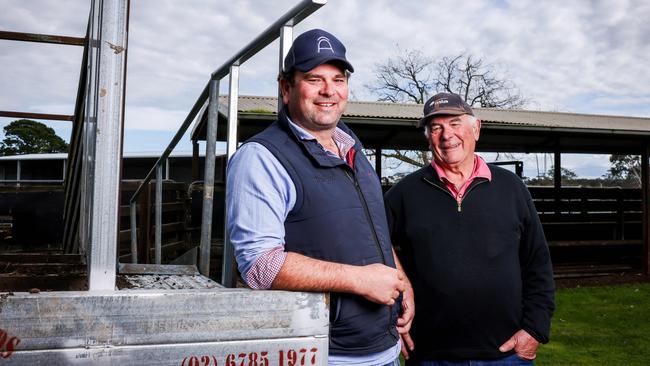
The aim was to measure, track and build SC over time.
Compost and rotational grazing, with rest periods, was helping grow more grass, increase animal’s weight gain, and hopefully, soil carbon.
A company was contracted (opposed to a brokerage firm) to manage any credits generated which is listed through the federal government’s Clean Energy Regulator database, under the Allen name.
David said the CER held 25 per cent of any credits, in case of a disaster (Fire, Drought).
“There is no downside to increasing SC,” David said.
“We’re aiming for a one per cent SC increase over the project area, and hopefully generate ACCU’s so we can keep them in the supply chain,” Nick said.
“There’s an opportunity to sell soil carbon to Coles, to inset within the supply chain,” David said. “All these big food companies are crying out to reduce Scope 3 emissions.
“As land managers we are in a great position to value-add our ecosystem services and help those within our supply chain.”





